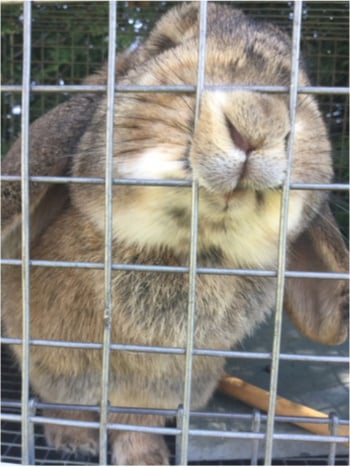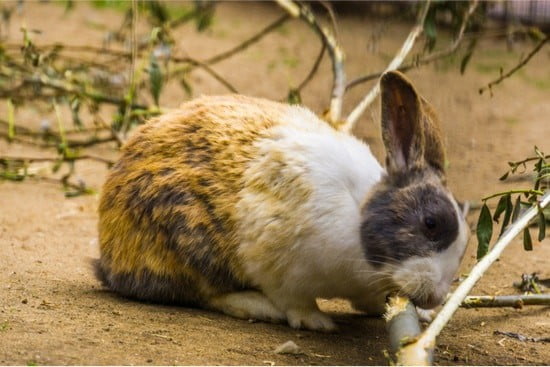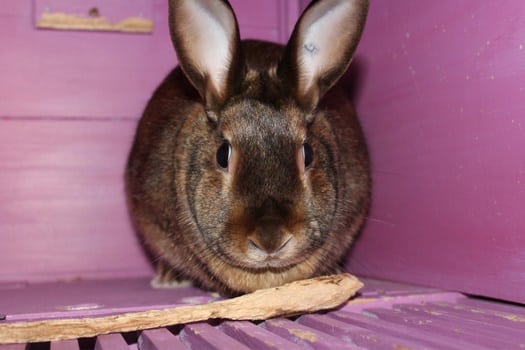Rabbits have strong teeth and a compulsion to chew everything. For safety, it’s crucial that you understand what a rabbit will and won’t chew on. Precautionary measures can then be implemented.
Tough metal wire can withstand a rabbit’s teeth, so this material is ideal for a rabbit hutch. But rabbits can chew through most other materials, including chicken wire, plastic, vinyl, and solid wood.
If unsuitable materials are used for a hutch door, a rabbit can chew their way out. If the rabbit grows bored in the home, they’ll chew on household items, putting your family at risk of harm. That’s why preparing for chewing and biting should be the first step towards rabbit-proofing your property.
Why Do Rabbits Chew Everything?
Rabbits chew out of necessity, not just to make food easier to digest. Rabbit teeth are noticeably large, and they never stop growing. Without chewing, they’ll quickly become too large.
When a rabbit chews, they grind their top and bottom teeth together. This, in turn, stops them from getting too big. If a rabbit allows their teeth to grow excessively, they’ll become misaligned. This leaves rabbits unable to chew.
This is painful and potentially fatal. A rabbit that cannot use their teeth appropriately cannot eat. A rabbit that doesn’t eat for 24 hours or longer is in danger of starvation. Their bodies are too small to have sizable energy reserves.
There are other explanations beyond the necessity for rabbit chewing. Chewing is also a soothing activity for many rabbits. If a rabbit is feeling stressed or anxious, chewing will calm them down.
Rabbits chew because they’re bored. This is a common sight in rabbits locked in their hutch too long. Destructive behaviors pass time and attract human attention.
We’ve put together a guide to the items that rabbits should never chew.
Can Rabbits Chew Through Plastic?
Rabbits enjoy chewing plastic. This is because it’s sturdy and robust for gnawing, but is light enough to play with. Some rabbits knock over and chew their food bowl or litter tray.
You’ll need to manage your pet’s plastic exposure carefully. Most rabbits enjoy playing with a single-use plastic water bottle, for example. They can spin it around, roll it, and chew through it.
Most rabbit products are made from plastic. Brightly-colored plastic is designed to attract the eye of human buyers, not to service the needs of animals. Some rabbits are allergic to plastic.
If you buy plastic toys or peripherals for your rabbit’s hutch, you must ensure that they’re sturdy enough to withstand your rabbit’s teeth. They should feel reassuringly weighty in your hand. Anything lightweight will be chewed to pieces and pose a potential danger.
Have you ever bought home shopping while your rabbit runs free? If so, you’ll know that plastic bags are irresistible to rabbits. Rabbits like the sound they make, and will play with them for hours.
This is dangerous. It’s easy for a rabbit to get trapped in the bag and lose oxygen. If your rabbit gets access to a plastic bag, remove it quickly. The rabbit may be annoyed, but you’re saving their life.
Can Rabbits Chew Through Vinyl?
Vinyl is a popular addition to many homes, especially the kitchen. It’s a cost-effective way to cover dated wooden surfaces. It’s also a cheap and clean form of home flooring.
Rabbits like vinyl due to the challenge that it represents. If laid appropriately, vinyl can be tough to pull up and remove. Not for a rabbit, though. They’ll dig with their claws and then chew what arises.
Vinyl is tough. Often, this means a rabbit will chew for a while then spit it out if they don’t get the impression that it will be tasty to eat. This doesn’t mean a rabbit will never eat vinyl, though.
If the pieces are small enough, they may swallow them. Whether by accident or design, the result will be the same. If it’s too big to digest, the vinyl could cause an intestinal blockage.
Even if you avoid this scenario, think about what’s under the vinyl. Did you use glue or staples to lay the vinyl? These can be harmful to a rabbit if licked or swallowed. That’s not even considering if there are any bacteria on the material.
Vinyl is available in other forms. Some owners use vinyl tubing to cover electrical wires, or the bars on a rabbit cage. There are better options. Vinyl will always appeal to a rabbit as it’s tough.
Can Rabbits Chew Through Metal Wire?
Wire fences are often used to keep rabbits out of gardens. It’s effective, especially if high, but rabbits are capable of chewing through wire. It requires patience, but rabbits are determined creatures.
Wire mesh is also a popular component of all rabbit hutches. It’s required to enclose the rabbit inside their home, but also allow air to circulate. Applying something solid, like a sheet of PVC, would deprive the occupants of oxygen.

There’s one primary problem with wire, though. It comes in various forms, and some of them are easy for a rabbit to chew through. This means that your rabbit could make a late-night escape by biting through their wire.
Chicken wire, for example, is thin. As the name suggests, it is commonly used in chicken coops. Many people also consider it suitable for a rabbit hutch, but it isn’t. They can work through chicken wire with little effort. That’s something to consider before putting chicken and rabbits together.
Hardware cloth is a sturdier alternative. This commercially available form of wire mesh will keep your rabbit safe and secure. The Rabbit House has insights into the recommended width and application.
Why Does My Rabbit Chew the Wire on Their Hutch?
You should consider why your rabbit is determined to chew through the wire on their hutch. It’s not the behavior of a happy and contented rabbit. They’re trying to tell you something. Common explanations for this behavior include:
- They want social time. Your rabbit knows that you are awake and active. They’re worried that they’re missing out on something. They’ll be desperate to escape their hutch and join in.
- They are bored. Maybe your rabbit doesn’t have enough toys in their home. Perhaps they have plenty, but are wary of them. They’ll amuse themselves by chewing on the wire of their hutch.
- They lack space. Rabbits grow quickly. You may find that the hutch that formerly suited their needs is now too small. If a rabbit feels cramped, they’ll do anything to achieve freedom.
- They are stressed. Just missing a scheduled mealtime can cause anxiety. They may chew their hutch to self-soothe. This will often be accompanied by pulling out their fur.
- Their teeth hurt. Rabbits need to chew to wear down their teeth. If their pearly whites are causing pain, chewing may soothe this. Get your rabbit’s teeth checked by a vet.
Can Rabbits Chew Through Wood?
As rabbits chew on tree bark and branches, it’s safe to assume that they can also chew through wood. Eventually, a rabbit can gnaw through any form of wood.
Your rabbit should never be permitted to chew on varnished, finished wood. The chemicals involved in the treating of this material could be harmful.
If your rabbit is a determined chewer, assign them a piece of wood. This will keep them occupied, and file their teeth. You’ll have to ensure that it’s from a rabbit-safe tree. These include:
- Birch
- Willow
- Hawthorn
- Hazel
- Fir
- Maple
- Spruce
Do not use wood from a fruit tree, unless it’s one of the following:
- Apple
- Raspberry
- Blackberry
- Pear
Avoid collecting wood from the dump, or the ground of local forestry. The former is filled with chemicals and parasites. The latter may contain traces of bacteria from animal waste. Wood should also have fallen from a tree at least one month ago, too.
If you think of a material, the chances are that your rabbit will chew on it. It’s an ingrained behavior in rabbits, and not something they can ignore. Instead, you’ll need to factor rabbit chewing into your pet-proofing measures.
If you give your rabbit alternative entertainment, they’re less likely to chew inappropriately. They’ll restrict the activity to assigned toys and hay. This will benefit all parties.

Can I Stop My Rabbit from Chewing?
You can stop a rabbit from chewing inappropriate items. Left to their own devices, rabbits will chew through anything they can fit in their mouths.
In some instances, this will be destructive. You’ll lose a favorite pair of shoes, or the book you’re enjoying will be in shreds. In other cases, it’s dangerous.
In the event of a potential hazard, such as electrical wires, don’t take any chances. Cover these tantalizing chew spots with a material that your rabbit cannot chew through. Split loom tubing will usually do the trick.
An instinct of most owners is to deter chewing behavior through discipline. This is inadvisable. Making a loud noise, and offering a stern, “no” command, will get a rabbit’s attention.
In some cases, a strong-minded rabbit will ignore you. They’re the boss, and they’ll do what they want. Some rabbits will become aggressive, as they feel you’re on their territory. Others will start to fear you, damaging your bond.
Distraction through pleasurable activities is better. Find chew toys around the house. Get down to your pet’s level and play with them (regular daily exercise). Provide opportunities to dig, and climb. If your rabbit is distracted, they’re less likely to chew.
You could also consider a spray that makes the scent and taste of their chew targets unappealing. This doesn’t always work, though. Some rabbits are determined enough to work past their initial repulsion.
If you wish to attempt a deterrent through scent, pet stores sell spray bottles. If you’d rather make your own, use bitter smells. These are disagreeable to most rabbits. Oakhill Gardens provide further advice on non-harmful chewing deterrents for rabbits.


Can rabbits eat pvc pipe
What’s the best metal wire for rabbits in outside cages